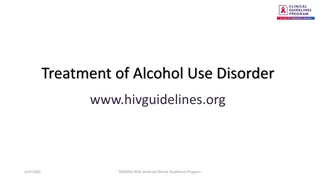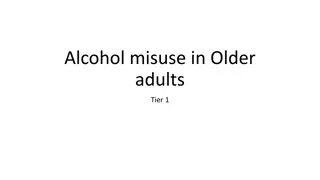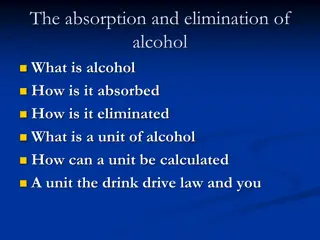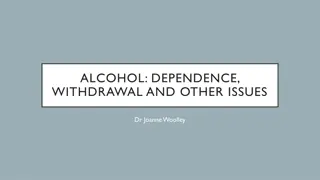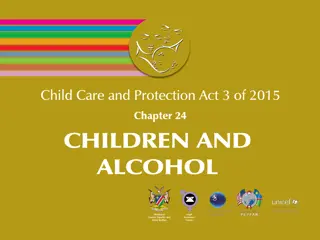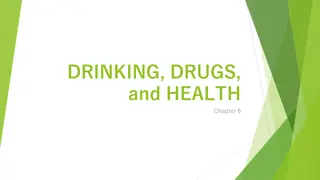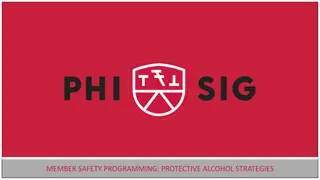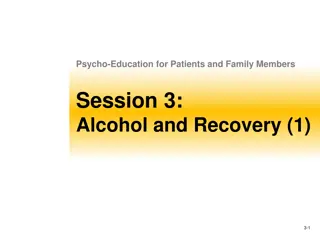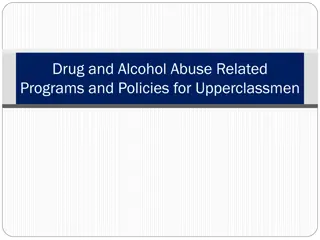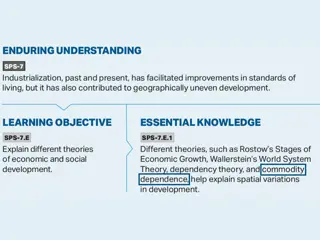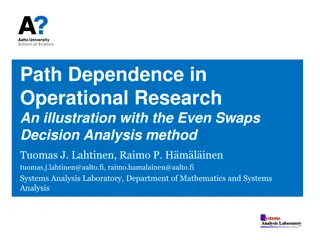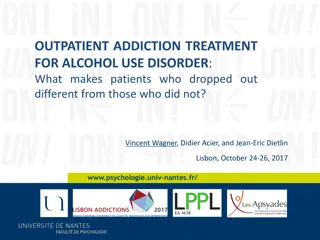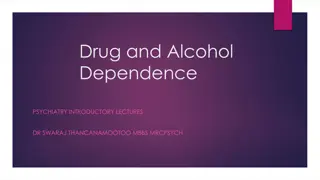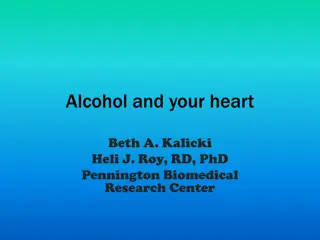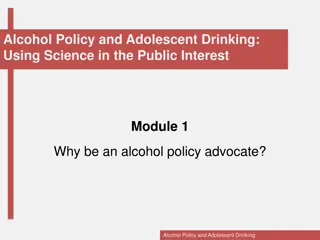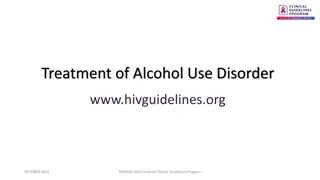Understanding Alcohol Dependence: Causes, Effects, and Treatment
Alcohol Dependence Syndrome is a serious issue affecting individuals and society. This overview covers the definition, properties, epidemiology, causes, stages, and clinical features of alcoholism. It discusses the different types of drinkers, the process of alcoholism, and the clinical manifestations associated with alcohol dependence.
Download Presentation

Please find below an Image/Link to download the presentation.
The content on the website is provided AS IS for your information and personal use only. It may not be sold, licensed, or shared on other websites without obtaining consent from the author. Download presentation by click this link. If you encounter any issues during the download, it is possible that the publisher has removed the file from their server.
E N D
Presentation Transcript
ADS Mrrs.Mercy Deva Priya Asst.Prof .Dept of MHN
ALCOHOL DEPENDENCE SYNDROME Alcohol Means Essence, anciently it called as Magnus Hass which is derived from Arabic Word. Alcoholism refers to the uses of alcoholic Beverages to the Point of Causing Damage to the Individual, Society, Or Both. (Or) Chronic Dependence of Alcohol Characterized by Excessive & Compulsive Drinking that produce Disturbances in mental Or Cognitive level of functioning which interferes with social & Economic Levels.
PROPERTIES OF ALCOHOL Alcohol is a Clear Colored Liquid with a Strong Burning Taste. The Rate of Absorption of alcohol into the Blood stream is more Rapid than its Elimination. Absorption of Alcohol into the Bloodstream is Slower when food is Present in the Stomach. A Small amount is Excreted through Urine & a Small Amount is Exhaled.
EPIDEMIOLOGY Incidence of Alcohol Dependence is 2% in India. 20 30 % of Subjects Aged Above 15years are Current Users Of Alcohol, & Nearly 10% of them are Regular Or Excessive Users. 15 30 % Of Patients are Developing Alcohol Related Problems & Seeking admission in Psychiatric Hospitals. TYPES OF DRINKERS MODERATE DRINKERS PROBLEM DRINKERS It does not Cause much problems physically & Mentally It Cause Impaired Health, Family & Society
CAUSES OF ALCOHOLISM Hard physical Labour, ( Occupations Bar mates, Medical Professionals, Journalists & Actors). A Sudden loss of Properties or Closed ones. Ignorance Suddenly a person Become a Rich / Poor. Disorders Like Depression, Anxiety, Phobia, & Panic Disorders. Biochemical Factors (Alterations in Dopamine & Epinephrine) Psychological factors (Low self Esteem, Poor Impulse, Escape From reality, Pleasure Seeking). Sexual Immaturity Social Factors ( Over Crowding, Peer Pleasure, Urbanizations, Religious Reason, Unemployment, Poor Social Support, Isolation).
PROCESS OF ALCOHOLISM Experimental Stage Recreational Stage Relaxation Stage Compulsion Stage STAGES OF ALCOHOLISM Progressive Phase Crucial Phase Chronic Phase Rehabilitative Phase Road For Recovery
CLINICAL FEATURES OF ALCOHOL DEPENDENCE Minor Complaints : (Malaise, Dyspepsia, Mood Swings Or Depression, Increased Incidence of Infection) Poor Personal Hygiene Untreated Injuries (Cigarette Burns, Fractures, Bruises that cannot be fully Explained). Unusually High tolerance for Sedatives & Opioids. Nutritional Deficiency ( Vitamins & minerals).
Secretive Behavior (may Attempt to Hide disorder or Alcohol supply). Consumption Of Alcohol- Containing products (Mouthwash, After-Shave lotion, Hair Spray, Lighter Fluid, Body Spray, Shampoos). Denial of Problem. Tendency to Blame others & Rationalize Problems (Problems Displacing Anger, Guilt, Or Inadequacy Onto Others to Avoid Confronting Illness).
ICD-10 CRITERIA FOR ALCOHOL DEPENDENCE A Strong Desire to take the Substance Difficulty in Controlling Substance Taking Behavior A Physiological Withdrawal State. Progressive neglect of Alternative pleasures or Interests. Persisting with Substance Use Despite Clear Evidence of Harmful Consequences PSYCHIATRIC DISORDERS DUE TO ALCOHOL DEPENDENCE Acute Intoxication Withdrawal Syndrome Alcohol-Induced Amnestic Disorders Alcohol-Induced psychiatric Disorders
ACUTE INTOXICATION It Develops During Or Shortly After Alcohol Ingestion. It is Characterized by, Clinically Significant Maladaptive Behavior or Psychological Changes (Eg s: Inappropriate Sexual or Aggressive Behavior). Mood Lability Impaired Judgment Slurred Speech Inco-ordination Unsteady gait Nystagmus Impaired Attention & Memory Finally Resulting in Stupor or Coma.
WITHDRAWAL SYNDROME Person Who Have been Drinking Heavily Over a Prolonged period of time, Any Rapid Decrease in the amount of Alcohol in the Body is likely to Produce Withdrawal Symptoms. These are: Simple Withdrawal Symptoms Delirium Tremens SIMPLE WITHDRAWAL SYNDROME: It is Characterized by, Mild tremors Nausea Vomiting Weakness Irritability Insomnia Anxiety
DELIRIUM TREMENS It Occurs Usually within 2- 4days of Complete or Significant Abstinence From Heavy drinking. The course is Very Short, with Recovery Occurring within 3-7days. It is Characterized by, A Dramatic & Rapidly Changing Picture of Disordered Mental Activity, with Clouding Of Consciousness & Disorientation in Time & Place. Poor Attention Span. Vivid Hallucinations which are Usually Visual, Tactile Hallucinations Can also Occur. Severe Psychomotor Agitation Shouting & Evident Fear Grossly Tremulous Hands which Sometimes Pick-Up Imaginary Objects; Truncal ataxia. Autonomic Disturbances Such as Sweating, Fever, Tachycardia, Raised Blood pressure, Pupillary dilation. Dehydration with Electrolyte Imbalances. Reversal of Sleep-Wake Pattern or Insomnia Blood tests to Reveal Leucocytosis & LFT Death may Occur due to Cardiovascular Collapse, Infection, Hyperthermia, Or self Inflicted Injury.
ALCOHOL-INDUCED AMNESTIC DISORDERS Chronic Alcohol Abuse associated with Thiamine Deficiency (Vitamin B) is the most frequent Cause of Amnestic Disorders. This Condition is Divided into : Wernicke s Syndrome Korsakoff s Syndrome WERNICKE S SYNDROME is Characterized by, Prominent CerebellarAtaxia Palsy of the 6th Cranial Nerve Peripheral Neuropathy Mental Confusion KORSAKOFF S SYNDROME Gross Memory disturbance. Other Symptoms Include: Disorientation Confabulation Attention Span & Distractibility Impairment of Insight Confusion Poor
ALCOHOL-INDUCED PSYCHIATRIC Alcohol Induced Dementia: It is a long term Complication of Alcohol Abuse, Characterized by Global decrease Functioning (Decreased Intellectual Functioning & Memory). This Disorder tends to Improve With Abstinence, But Most of The Patients may disabilities. Alcohol-Induced Disorders: Persistent Depression & Anxiety Suicidal Alcohol-Induced Disorders: Panic Attacks Impaired Psychosexual Dysfunction: Erectile Dysfunction & Delayed Ejaculation Pathological Jealousy: Delusion of Infidelity Alcoholic Seizures: Generalized Tonic - Clonic Seizures Occur Within 12-48 Hours After a Heavy Bout of Drinking. Epilepticus Alcoholic Hallucinosis: Presence Hallucination during Abstinence RegularAlcohol Intake Mood DISORDERS Behavior Anxiety in cognitive have Permanent Status of Auditory
RELAPSE Relapse refers to the process of returning to the use of alcohol or drugs after a period of Abstinence. Relapse Dangers: The presence of drugs or Alcohol, Drug users, Places where you used Drugs. Negative Feelings, Anger, Sadness, Loneliness, Guilt, Fear, & Anxiety. Positive Feelings which make you celebrate. Boredom A State of Feeling Bored. Increase the Intake of drug. Physical pain Lot of Cash
Warning Signs Of Relapse: Stopping medications on one s own or against the advise of medical professionals. Hanging around old drinking haunts & drug using Friends. Isolating themselves. Keeping Alcohol, drugs around the houses for some reason. Obsessive thinking about using drugs / Drinking. Fail to follow their treatment plan, Quitting therapies, Skipping doctor s appointments. Feeling Over Confident Difficulties in Maintaining Relationships. Setting Unrealistic Goals. Changes in Diet, Sleep, Energy levels, & Personal Hygiene. Feeling Overwhelmed. Constant Boredom. Sudden Changes in Psychiatric Symptoms. Unresolved Conflicts. Avoidance. Major life Changes loss, Grief, Trauma, Painful Emotions, Winning the Lotteries. Ignoring Relapse warning Signs & Symptoms
COMPLICATIONS OF ALCOHOL ABUSE Alcohol Damages body Tissues by Irritating them Directly Changes that Occur During Alcohol Metabolism by Interacting With other drugs Aggravating Existing disease / Accidents brought on by IntoxcificationTissue Damage can Lead to a Host of Complications Gastro Intestinal Complications Neurologic Complications Chronic Diarrhea Esophagitis Esophageal Cancer EsophagealVarices Gastric Ulcers Gastritis Gastro Intestinal Bleeding Malabsorption Pancreatitis Alcohol Dementia Alcoholic hallucinosis Alcohol Withdrawal Delirium Korsakoff s Syndrome Peripheral Neuropathy Seizure Disorders
Subdural Hematoma Wernicke s Encephalopathy Cardiopulmonary Complications Psychiatric Complications Arrhythmias Cardiomyopathy Essential Hypertension Chronic Obstructive Pulmonary Disease Pneumonia Increased Risk of Tuberculosis Amotivational Syndrome Depression Impaired Social & Occupational Functioning Multiple Substance Abuse Suicide
Hepatic Complications Other Complications Alcoholic Hepatitis Cirrhosis Fatty Liver Beri Beri FetalAlcohol Syndrome Hypoglycemia Leg & Foot Ulcers Prosatitis
DIAGNOSIS DIAGNOSIS Blood alcohol level to indicate intoxication (200mg/dl) Urine toxicology Syrem electrolyte anlaysis Lever function studies Electrocardiography Echocardiography Based on ICD10 criteria.
TREATMENT FOR WITHDRAWAL TREATMENT FOR WITHDRAWAL SYMPTOMS SYMPTOMS Detoxification It is the treatment for alcohol withdrawal symptoms. The drugs of choice are benzodiazepines Alcohol deterrent therapy Deterrent agents are those which are given to desensitize the individual to the effect of alcohol and maintain abstinence of the alcohol. The commonly used drug is disulfiram (tetraethyl thiuram disulfide) or antabuse.
Disulfiram It is used to ensure abstinence in the treatment of alcohol dependence. Its main effect is to produce a rapid and violently unpleasant reaction in a preson who ingest even a small amount of alcohol while taking disulfiram or antabuse. Dosase Disulfiram is supplied in tablets of 250 mg and 500 mg. The usual initial dose is 500 mg per day orally for the first two weeks followed by a maintenance dose of 250 mg per day.
PSYCHOLOGICAL TREATMENT PSYCHOLOGICAL TREATMENT Motivational interviewing Group therapy Aversive conditioning Cognitive therapy Relapse prevention techniques Cue exposure technique Assertive training Behaviour counselling
MANAGEMENT MANAGEMENT When assessing the patient who abuses the substance it is first important to remember that underneath the surface of denial and rationalization are the feeling of fear, insecurity, anxiety and low self esteem. Identify the type of substance the person has been using, the amount, frequency, method of administration and the length of time the substancr has been abused. Note of any suicidal ideation or intent, with drained symptoms. Assess for level of motivation for treatment. Identify reason for admission. A baseline physical and emotional nursing assessment is done to determine admission status and provide baseline from which to determine progress towars an expected outcome.
Develop trust, convey an attitude oif acceptance. Ensure that patient understands it is not him but his behaviour which is unacceptable. Provide positive reinforcement when patient shows insight into his behaviour. Teach the patient and family that alcoholism is a disease that requires long term treatment and followup. If drinking occurs, discuss the event that lead to the incident with the patient in a non-judgemental manner. Discuss ways to avoid similar circumstances in the future.



